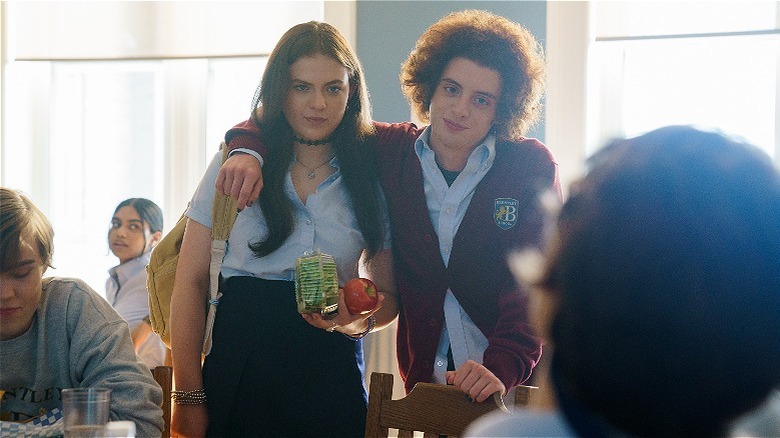Luckiest Girl Alive Author Jessica Knoll Wishes There Had Been More TifAni And Arthur Scenes In The Movie
The following article includes discussions of school shootings.
When Jessica Knoll first wrote "The Luckiest Girl Alive," people took note. Though the rights to adapt the story were seized almost immediately, it took seven years for Knoll's book to make it to screen (via Harper's Bazaar). There is little question of why this was the case. The personal story about trauma returning to haunt you is daunting, to say the least. When the film finally made it to Netflix, not only did the production feature many of the darkest moments of the book, but it also brought in Knoll to write the script.
Even though Knoll had creative control of the storytelling, some things did not make it from book to screen. "The Luckiest Girl Alive" covers the main points of the protagonist's trauma. Privileged New York writer Ani FaNelli (Mila Kunis) seems like she has it all but is thrown for a loop when an upcoming documentary forces her to relive her sexual assault in high school and the subsequent mass shooting by school outcast Arthur (Thomas Barbusca). Though Arthur and TifAni (Chiara Aurelia) — as she was known at the time — have their moments on screen, Knoll couldn't help but have regrets about what aspects never made it into the film.
If you or anyone you know has been a victim of sexual assault, help is available. Visit the Rape, Abuse & Incest National Network website or contact RAINN's National Helpline at 1-800-656-HOPE (4673).
Arthur and TifAni's relationship had to be condensed
When looking at the trailer or reading a synopsis for "The Luckiest Girl Alive," little allows for confusion about the subject matter. This is not a light and easy-going romp but features heavy material such as assault and the hot-button issue of school shootings. Jessica Knoll explained to Today that her inclusion of the shooting sequence was to make a point about victimhood. TifAni's ability to report her assault is confused in light of her friendship with Arthur, who is responsible for violence at school. When the story made it to the screen, some of the nuances of their dynamic were lost.
"I do wish that we could have spent a little bit more time with TifAni and Arthur," Knoll admitted to Variety. "I think that they have [...] such a complex relationship, and we have to move so quickly from her being accepted by the in-crowd, to the ostracization that happens and then going back to Arthur." TifAni was once friends with Arthur, who was on the low rung of the high school hierarchy, which the two bonded over. But as regrettable as it was to lose the details of this relationship, Knoll acknowledged that her reservations were unavoidable. One necessary evil of adaptation is condensing elements that were in the book. Due to pacing, including a few more scenes between TifAni and Arthur was just impossible.
The events of the story were inspired by Jessica Knoll's experiences
Any large profile production always seems to involve caveats. While based on a best-selling book and starring Mila Kunis, "The Luckiest Girl Alive" had a surprising amount of backlash due to the topics depicted. The reason that these subjects feel so visceral to viewers may be because they are steeped in reality. While Jessica Knoll maintains that "The Luckiest Girl Alive" is not a memoir, it is inspired by actual events. In an essay she penned on LennyLetter, Knoll described the challenging circumstances that led her to admit that she shared Ani's experience with assault. By the time the movie was in production, this information was public — at least to the cast of "The Luckiest Girl Alive." On the day of filming, Knoll elected not to be on set with respect for the actors enacting the scene.
"I started thinking about how uncomfortable it would be for the actors to have me there, especially with them knowing that so much of this is inspired by my own story. Especially seeing how truly young these actors are," Knoll told The Hollywood Reporter. She explained: "I was just like, 'this is gonna be hard for everybody, and I don't need to add to that by being there. My presence will complicate this for people.'" The film may not please everyone, but there is no doubt that Knoll injected as much care into the material as possible.


